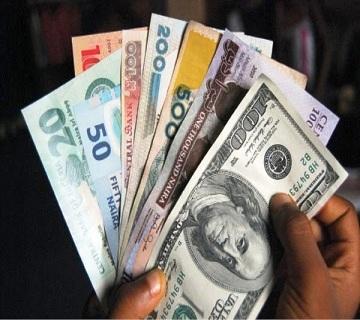General News
Nigeria week in review: Dollar losses mojo, Oil falls but Naira stabilize

This has been a rollercoaster week defined by volatile stock markets, dollar weakness, a dovish Federal Reserve and shaky Oil prices.
Global confidence remains fragile thanks to coronavirus-related concerns with lingering fears over slowing global growth and trade tensions fostering a sense of caution. This sentiment was reflected across equity markets on Thursday, as stocks suffered their biggest one-day pull-back in three months as traders grew warier about the number of rising coronavirus cases in several US states.
A sense of confidence over the world economy recovering quicker than anticipated initially weakened the Dollar earlier in the week. However, the unwelcome return of coronavirus related fears may spark risk aversion ultimately boosting appetite for the world’s reserve currency – something that will pressure emerging market currencies like the Naira.
Over the past few weeks, investors across the globe have been incredibly optimistic as countries loosened lockdown restrictions and central banks unleashed waves of stimulus measures against the coronavirus menace. In Nigeria, the Central Bank of Nigeria cut interest rates for the first time since March 2019 while the International Monetary Fund (IMF) approved $3.4 billion in emergency funding to the country.
While lower interest rates have the potential to stimulate consumption and the IMF loan could offer fiscal support, the major issue remains lower Oil prices. Given how roughly 90% of export earnings and over 70% of government revenues are sourced from Oil sales, the volatility witnessed in Brent Oil poses a significant threat to Nigeria’s economic outlook.
What is even more concerning is the fact that Nigeria will cut its oil supply to 45,000 barrels a day below its OPEC+ quote during Q3 to make up for over-production in May. If Oil prices end up depreciating due to coronavirus related fears, Nigeria’s export earnings and government revenues may drop considerably during the third quarter of 2020. Such an unfavourable development could hit the Naira, punish local stocks, trigger inflationary pressures and ultimately sabotage economic growth.
On the bright side, the Naira maintained stability against the Dollar at the parallel markets this week. The Naira traded around N450 to $1 despite the shaky sentiment, questions over world growth and coronavirus fears.
General News
Lagos Trends Worldwide After Hosting E1 Lagos GP Africa’s Maiden Water Racing Event

History was made on October 4 and 5, 2025, on the waters of the Lagos Lagoon as Team Brazil by Claure Group claimed victory at the E1 Lagos GP presented by FirstBank.

The landmark event marked Africa’s debut on the global calendar of the E1 Series, the world’s first electric powerboat championship, and positioned Lagos at the forefront of sustainable sporting innovation.
The E1 Lagos GP drew thousands of fans to multiple viewing locations across the city, from the vibrant Official Fan Zone to the Ocean’s Club at Black Diamond Hotel and the Lagos Oriental Hotel Decks, which hosted premium hospitality experiences along the waterfront.
The Official Fan Zone quickly became the heartbeat of the event, attracting young Nigerians with immersive brand activations, race simulators, live music, and a festival energy that perfectly matched the excitement on the water.
After an action-packed weekend of competition, Team Brazil by Claure Group finished first, fending off strong performances from Team Blue Rising who placed second, and Team Drogba Global Africa who finished third.
Pilots Timmy Hansen and Ieva Millere-Hagin powered Team Brazil to victory, with Timmy Hansen named PIF Pilot of the Race. Racing was briefly delayed by a tropical storm over the Lagos Lagoon, but organisers and teams worked together to ensure the programme resumed safely and on schedule.
The outcome strengthens Team Brazil’s momentum as the season moves toward the Miami finale in November, while Team Brady retains the overall championship lead and a tight contest continues with Team Rafa.
The Lagos event also reinforced the E1 Series’ sustainability mission, showcasing zero emission race technology and local legacy initiatives including coastal clean-up and mangrove restoration programmes.
The race weekend attracted local and international media, dignitaries and sporting figures and underlined Lagos’ capacity to host major global sporting events on its waterways. By successfully staging the first E1 race on African soil, Lagos joins Monaco, Dubrovnik and Doha as an E1 host city and affirms its positioning as a centre for innovation, culture and sustainable sport.
General News
Africa Enters Age of Intelligence with an Advantage

Africa heads into the Age of Intelligence with a distinct advantage: its people. By 2030, Sub-Saharan Africa will account for half of all new workers worldwide.

According to a new report, this is more than just a demographic fact; it is a historic opportunity. The report also states that talent remains the critical foundation of the AI stack—talent, data, compute, and use cases.
Zindi’s Kenya country report, compiled in collaboration with Dalberg Data Insights and the International Centre for AI Research Ethics, explored employability and career outcomes.
Zindi is professional community of African data scientists, working to solve the world’s most pressing challenges using machine learning and AI.
The report’s forward was written by Philip Thigo, special envoy on technology of Kenya, and states that without skilled employees, data is unrefined, compute is idle, and use cases are irrelevant. And he makes it clear: Africa’s talent is already contributing to the global AI economy, rather than waiting to be included.
Thigo goes on to say the evidence is compelling, stating: “Nearly 1 in 5 Kenyan Zindi users experienced a career change after joining the platform.
“More than 80% of those with completed profiles advanced in their careers, compared to just 3% without.
“Completing four or more challenges makes a user four times more likely to secure employment, while engaging in teams and discussions makes them three times more likely to get jobs.”
“These findings highlight an important truth: employability today is built not just in classrooms, but also in communities of practice, peer learning, and collective intelligence.”
According to Thigo, in this dynamic talent climate, companies must look beyond degrees and leader boards to find a vast pool of market-ready AI talent defined by resilience, collaboration, and creativity.
Similarly, politicians and educators are informed that the message is obvious.
Thigo writes: “If Africa is to secure its place in the digital economy, we must reimagine how we connect our youth to opportunity. Platforms like Zindi show that talent is abundant; what is needed are pathways that translate skills into livelihoods, and ecosystems that link learning to work.”
For Kenya, he notes that this resonates deeply with the country’s broader ambition: to build a sovereign AI ecosystem powered by African talent, clean data, and green compute—ensuring that Africa is not just a consumer of technology, but a creator of it.
General News
NITDA Calls for a Safer Tomorrow @ National Cyber Security Awareness Month 2025

As the world becomes increasingly digital, our daily lives are now more connected than ever, through our phones, computers, and the internet we use every day. But with this growing connection comes a growing risk: hackers, scams, and cyber threats waiting for just one careless click.

The National Information Technology Development Agency (NITDA) is using this Cybersecurity Awareness Month to remind Nigerians that cyber safety begins with individual responsibility.
Everyone has the power to protect themselves and their communities by adopting simple but effective cyber hygiene practices, including:
- Using strong and unique passwords for all online accounts.
- Enabling two-factor authentication to add extra security layers.
- Keeping devices and applications updated regularly.
- Backing up important data frequently.
- Avoiding suspicious links or attachments from unknown sources.
- And thinking carefully before sharing personal or financial information online.
The theme for this year, “Cyber Hygiene for a Safer Tomorrow,” emphasizes that cyber hygiene is not only a personal responsibility but a collective effort. When individuals protect themselves, they also safeguard their families, workplaces, and the broader digital community.
As we continue to build a secure and digitally resilient Nigeria, NITDA calls on all citizens to stay alert, click wisely, and stay safe online.

 Telecom2 days ago
Telecom2 days agoAkwa Ibom, T2 Set to Drive Digital Transformation

 E-Business2 days ago
E-Business2 days agoKaspersky, Partners Launch a Career Orientation Test to Inspire more Girls into Cybersecurity

 E-Financial2 days ago
E-Financial2 days agoAfDB to Lend Nigeria $500m in Fresh Budget Support

 Telecom2 days ago
Telecom2 days agontel Gets Fresh Capital Injection for 2026 Relaunch

 E-Financial2 days ago
E-Financial2 days agoCBN Releases New Guidelines, Caps POS Agent Daily Transactions at N1.2m

 Telecom1 day ago
Telecom1 day agoChronicles Software unveils free SuccessBOX.ng platform for SS3 students, announces ₦10m reward scheme

 E-Financial2 days ago
E-Financial2 days agoFidelity Bank Hosts Black-Tie Gala Honouring Afreximbank President Prof. Benedict Oramah

 E-Financial2 days ago
E-Financial2 days agoReps Plan to Regulate Cryptocurrency, PoS Operations





















